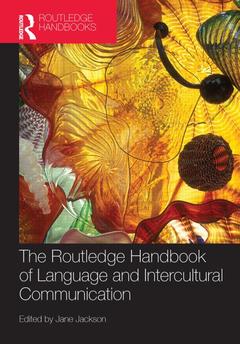The Routledge Handbook of Language and Intercultural Communication Routledge Handbooks in Applied Linguistics Series
Coordonnateur : Jackson Jane

The Routledge Handbook of Language and Intercultural Communication constitutes a comprehensive introduction to the multidisciplinary field of intercultural communication, drawing on the expertise of leading scholars from diverse backgrounds. The Handbook is structured in five sections and covers historical perspectives, core issues and topics, and new debates in the field, with a particular focus on the language dimension. Among the key themes addressed are: the foundation of intercultural communication; core themes and issues; putting intercultural communication theory into practice; new debates and future directions. The Handbook includes an introduction and overview by the editor, which provides readers with an indication of the focus of each section and chapter.
The Routledge Handbook of Language and Intercultural Communication is the ideal resource for advanced undergraduates and postgraduate students of applied linguistics, TESOL/TEFL and communication studies.
Introduction. Jane Jackson. Section I: Foundations of Language and Intercultural Communication 1. The history and development of the study of intercultural communication and applied linguistics. Judith N. Martin, Thomas K. Nakayama and Donal Carbaugh 2.Culture, communication, context and power. Adrian Holliday. 3. Language, identity and intercultural communication. Kimberly A. Noels, Tomoko Yashima and Rui Zhang 4. Interculturality and intercultural pragmatics. Istvan Kecskes. 5.Conceptualizing intercultural (communicative) competence and intercultural citizenship. Michael Byram. Section II: Core Themes and issues. Verbal/nonverbal Communication and Culture 6. Linguaculture and transnationality: the cultural dimensions of language.Karen Risager 7. Intercultural rhetoric and intercultural communication.Dwight Atkinson. 8. Nonverbal communication: The messages of emotion, action, space and silence. David Matsumoto and Hyi-sung Hwang 9. Speech acts, facework and politeness: Relationship-building across cultures.Winnie Cheng. Language, Identity, and Intercultural communication. 10. Gender, language, identity and intercultural communication. Xingsong Shi and Juliet Langman. 11. Cultural identity, representation and Othering. Fred Dervin. 12. Other-language learning, identity and intercultural communication in contexts of conflict. Constadina Charalambous and Ben Rampton. 13. Intercultural contact, hybridity and third space.Claire Kramsch and Michiko Uryu. Understanding Intercultural Transitions: From Adjustment to Acculturation 14. Beyond cultural categories: communication, adaptation and transformation. Young Yun Kim. 15. Acculturating intergroup vitalities, accommodation and contact. Howard Giles, Douglas Bonilla and Rebecca B. Speer. Intercultural Communicative Competence: Multiple Conceptual Approaches.16. Language: An essential component of intercultural communicative competence. Alvino E. Fantini.17. Understanding intercultural conflict competence: Multiple theoretical insights. Stella Ting-Toomey. 18. The intercultural speaker and the acquisition of intercultural/global competence.Jane Wilkinson.19. World Englishes, intercultural communication and requisite competencies. Farzad Sharifian. Section III: Theory into Practice: Towards Intercultural (Communicative) Competence and Citizenship. 20. An intercultural approach to second language education and citizenship.Peih-ying Lu and John Corbett. 21. Intercultural communicative competence through telecollaboration.Robert O’Dowd. 22. Critical language and intercultural communication pedagogy. Manuela Guilherme. 23. Intercultural training in the global context. Kathryn Sorrells. 24. Multiple strategies for assessing intercultural communicative competence. Alvino E. Fantini. Section IV: Language and Intercultural Communication in Context. 25. Second language teacher education. Michael Kelly. 26. The English as a foreign or international language classroom. Phyllis Ryan. 27. The multicultural classroom. Jennifer Mahon and Ken Cushner. 28. Education abroad.Jane Jackson. 29. Business and management education. Prue Holmes. 30. Professional and workplace settings. Martin Warren. 31. Translation, interpreting and intercultural communication. Juliane House. 32. Culture and health care: Intergroup communication and its consequences. Bernadette Watson, Cindy Gallois, David G. Hewett and Liz Jones. 33. Legal contexts.Christoph A. Hafner. 34. Tourism. Gavin Jack and Alison Phipps. Section V: New Debates and future directions. 35. A global agenda for intercultural communication research and practice. Malcolm N. MacDonald and John P. O'Regan
Jane Jackson is Professor of Applied English Linguistics at the Chinese University of Hong Kong.
Date de parution : 08-2013
17.4x24.6 cm
Date de parution : 11-2011
Ouvrage de 632 p.
17.4x24.6 cm
Disponible chez l'éditeur (délai d'approvisionnement : 13 jours).
Prix indicatif 264,06 €
Ajouter au panierThème de The Routledge Handbook of Language and Intercultural... :
Mots-clés :
Intercultural Communication; Intercultural Communication Competence; Intercultural Competence; routledge handbooks; Intercultural Speaker; Jane Jackson; Intercultural Communication Research; interculturality; Vice Versa; transnationality; Intercultural Citizenship; communication studies; Intercultural Interaction; language and identity; Critical Cultural Awareness; language and culture; English As A Lingua Franca; second language education; Citizenship Education; Intercultural Communication Studies; Education Abroad; Foreign Language Education; Uncertainty Avoidance; Intercultural Education; Sage; Host Language; Sage Handbook; Lingua Franca; Common Language; Intercultural Contact; Intercultural Encounters; Intercultural Training; FSI



